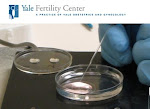Women with Polycystic Ovarian Syndrome (PCOS) have an increased risk for heart disease and possibly heart attacks compared to other women of the same age and weight, studies show. Specifically, the indications of cardiovascular disease include sub-clinical hardening of the arteries and signs of significant vascular impairment, including irregularities of the cells lining the arteries and blood vessels and increased thickness and decreased compliance of arterial walls. While the main focus of PCOS specialists is treating infertility, menstrual irregularities and unwanted hair, it’s important for women and their physicians to pay attention to the increased cardiovascular risk that accompanies PCOS as well, said Dr. Pinar Kodaman, a reproductive endocrine specialist who focuses on reducing cardiovascular risks for PCOS patients through lifestyle modification and medication. Dr. Kodaman is part of the multidisciplinary team at the Yale Polycystic Ovarian Syndrome Program that treats all aspects of PCOS.
Cardiovascular disease remains the most common cause of death among women, and risk of death from a heart attack increases with age, especially in the United States where there is a high incidence of obesity, a key contributor to heart disease.
At least 50% of women with PCOS in the U.S. are obese, 40% are insulin resistant, and 10% have type II diabetes. Insulin resistance, coupled with the body’s tendency to compensate by producing even more insulin, is one of the major factors in the development of Metabolic Syndrome, and this condition exacerbates elevated lipids in the blood, obesity, glucose intolerance and unwanted facial and body hair among women with PCOS.
PCOS is also associated with increased oxidative stress, high blood pressure, elevated levels of homocysteine, an amino acid in the blood that is an indicator of higher risk of heart disease, and dyslipidemia (an imbalance of lipids in the blood), all of which also contribute to cardiovascular risk. Interestingly, even young and lean women with PCOS tend to have unfavorable cardiovascular risk profiles, Dr. Kodaman said.
The studies on cardiovascular illness and death among PCOS patients are limited; however, the cardiovascular risks associated with the syndrome are clear.
The medical management of PCOS includes therapy for failure to ovulate or irregular ovulation, unwanted body and facial hair, as well as treatment of endometrial hyperplasia, a condition in which the lining of the uterus grows too much. In addition, obesity, dyslipidemia, hypertension, and insulin resistance should also be addressed if present. Lifestyle modification with diet and exercise are first line treatments, followed by insulin sensitizers, such as metformin, for insulin resistance and statin drugs, like Lipitor, for dyslipidemia. Statins may have additional beneficial roles in decreasing oxidative stress and improving hyperandrogenemia and other biochemical disorders of PCOS.
PCOS is the most common endocrine disease affecting women of reproductive age. Up to 10 million women in the United States have PCOS, a condition characterized by hyperandrogenism (excessive secretion of male sex hormones that results in unwanted facial and body hair) and oligomenorrhea (irregular menstrual periods). Frequently, the ovaries also have a polycystic appearance on ultrasound, which appears as multiple small follicles around the perimeter of the ovary. The cause of PCOS is unknown and researchers are actively investigating it.
PCOS occurs shortly after puberty and consists of altered gonadotropin secretion favoring luteinizing hormone production, which stimulates the ovaries to produce increased levels of androgens (male sex hormones). In addition, at the level of the ovary, the follicles make less estrogen and luteinize prematurely, thereby failing to ovulate.
While PCOS is an endocrine disorder affecting women during their reproductive years, its consequences continue to have detrimental effects in the postmenopausal years. A recent a study found that postmenopausal women with clinical features of PCOS had a greater incidence of cardiovascular events. Therefore, it is imperative that PCOS be diagnosed in a timely fashion and treated effectively across the lifespan.











